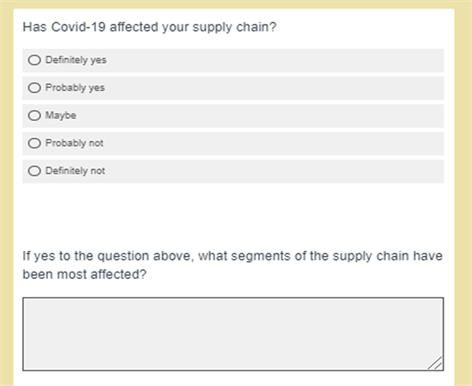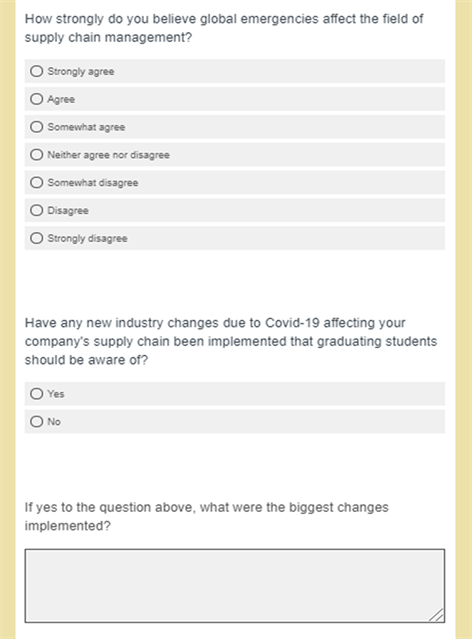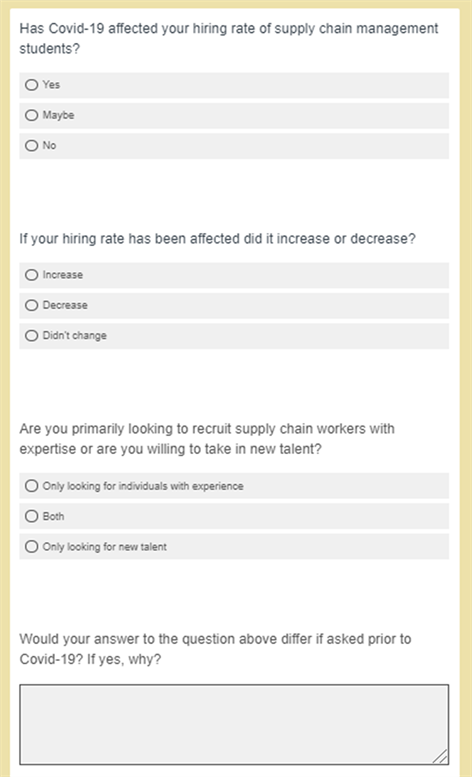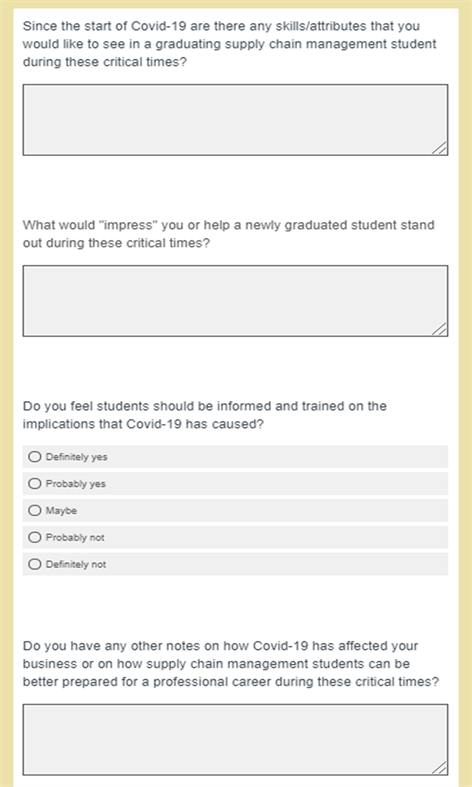Global Emergencies: How Do They Affect Supply Chain Management Students? ()
1. Introduction
Global emergencies can take a significant toll on the world in many ways. For example, the Covid-19 pandemic has taken its toll by shutting down millions of businesses for long periods of time, putting around 100,000 companies out of business for good within the first month of the outbreak in America ( Long, 2020), and putting around 40 million U.S. employees out of work by the third month of the outbreak ( Morath , 2020). This caused a lack of workforce and flow of goods, which in turn placed a high amount of stress on local and global supply chains.
Supply chain managers become very important to help organize, strategize, and improve upon a company’s supply chain after a global emergency occurs, but it is uncertain how the dramatic effects of a global emergency will affect the job market and field of supply chain management for newly graduated students with minimal experience. Therefore, it is the aim of this research thesis project to investigate disruptions along supply chains due to global emergencies like Covid-19 and discover if they have had a beneficial or negative effect on the need for Integrated Supply Management students. If the effect proves to be beneficial, it is important to use this information to promote the Supply Chain Management field and help students better pitch themselves towards employers during times of emergency and distress.
2. Background
A survey conducted by Resilinc that reviewed the initial effects of the Covid-19 pandemic found that 70% of the 300 businesses who participated were unprepared along their supply chains (Choi, Vakil, & Rogers, 2020). Data like this has alerted researchers to investigate the subject of emergencies and their effect on supply chain management. In, an article by Harvard Business Review they found that the Coronavirus outbreak should be a “wake-up call for supply chain management”. The article outlined how supply network mapping is missing in many companies and how supply chain disruption is often overlooked when evaluating suppliers (Choi, Vakil, & Rogers, 2020). These issues in supply chains brought about by Covid-19 must be addressed and should also be studied by students, so they may be prepared to help implement fixes in areas of their future employment.
Covid-19 has been one of the largest global emergencies in modern history, but it has not been the first. Past disasters such as, Chernobyl, the Fukushima Tsunami, and Hurricane Katrina have affected the world on a large scale as well (Kumar, 2011). In fact, many of the same faults along supply chains due to Covid-19 were also seen in those past disasters. Companies are now having to learn their lesson again after regretfully not fixing those faults (Linton & Vakil, 2020). Therefore, this “wake up call” or realization that many supply chain segments are not resilient enough for emergencies should raise awareness for the need of a supply chain that is prepared for the future. In turn, this may benefit the field and job market for supply chain management individuals, because of their ability to improve a company’s supply chain, by increasing performance, saving money, and adding another layer of efficiency to many other segments throughout the company (Pratt, 2013). This means that supply chain students may be of higher demand as they graduate and move onto their professional careers. The idea that global emergencies could possibly benefit the supply chain field and increase demand for supply chain students was the main driver of this research.
3. Research Methodology
The data for this project was gathered by sending out an anonymous link to a survey on the Qualtrics platform. The survey consisted of thirteen questions directed towards Supply Chain Management workers and employers. The survey included ranking, yes/no, and open-ended questions. Each of the respondents was sourced from Western Michigan University Alumni of the ISM Program now working in supply chain management positions. Of the 200 surveys sent out 121 took part in the survey, providing a 60.5% response rate to the survey. All the questions were formatted to maintain anonymity of the participants when answering. Each employer who participated in the survey did so voluntarily. The survey took place over a month’s period (October 2020). Throughout the duration of this study while the survey was open there were no major changes in the Covid-19 pandemic situation, so the survey was successfully able to gather information from employers during the same period of the pandemic while facing similar challenges.
4. Survey Content
The survey was created to find how global emergencies affect the field of supply chain management for newly graduated students with minimal experience. Is the field better because of the need to rebuild and reform supply chains and because it can be a great learning experience for new hires or has this hurt the hiring rate for supply chain students as highly experienced supply chain managers are primarily needed during these stressful times? To answer this question the survey was sent to a wide variety of employers from many different industries. The survey asked questions referring to periods before and during Covid-19. The content included questions surrounding these subjects in the supply chain field:
· Covid-19 effects,
· Supply chain segments most affected,
· Industry changes,
· Hiring rates,
· What level of expertise recruiters are looking for (New talent or experienced individuals)?
· Necessary skills and attributes of graduating students.
a. Should students be trained on the implications of Covid-19?
b. What would help a graduating student stand out?
-Please refer to Appendix A to view the full survey that was completed by the supply chain employers.
-Please refer to Appendix B to view the full responses to the open-ended questions that were completed by the employers.
5. Data Analysis
5.1. Sample Size
This study included a sample size of 121 participants. The size varies per question between 104 - 121 responses since not all questions were applicable to each participant. It was essential to have a large number of participants that included employers and supply chain workers from a wide variety of industries and companies. Employers from a wide variety of industries were used rather than employers from a specific industry so that overall data on how the field of supply chain management was affected by Covid-19 could be gathered. Also so that the data would more closely approximate the supply chain industry/population.
5.2. Covid-19’s Effects on the Supply Chain
Figure 1 and Figure 2 summarize how many employers in the supply chain field feel their company’s supply chain was affected by Covid-19 and how strongly they believe global emergencies in general affect supply chain management.
The data in Figure 1 & Figure 2 shows that over 99% agree and less than 1% disagree with the idea that Covid-19 and global emergencies affect supply chain management. This indicates that most employers do in fact believe that Covid-19 and global emergencies have a significant effect on supply chains across multiple industries. This is important information as it means that due to the significance of global emergencies on supply chain management there is more
![]()
Figure 1. Employers who believe Covid-19 has affected their supply chain.
![]()
Figure 2. Employers who believe global emergencies affect the field of supply chain management.
likely to be an effect on graduating students.
5.3. Important Changes
The pie chart in Figure 3 describes how many employers believe that there were significant changes within their company that graduating students should be aware of.
Based on the data found in Figure 3 it is indicated that 59% of employers believe that there were important changes implemented that graduating students should know about and 41% believe there were not. The results were quite even meaning depending on the company and industry there is about a 50% chance that as a graduating student there are some things you may need to be aware of.
There were two open ended questions asked in the survey relating to the data in Figure 3 to discover what the changes since Covid-19 were that employers believed graduating students should be prepared for. The first was “what segments of the supply chain have been most affected?” and the second was “what were the biggest changes implemented?”
It was found that all segments of the supply chain were affected in one way or another. Most prominently manufacturing, lead times, oversees suppliers shutting down, and productivity were affected. Manufacturing facilities adhering to new safety measures and many workers having shorter hours or working from home are some of the main ways they have been affected. Lead times have become unknown and extremely difficult to forecast. Many oversees suppliers have shut down making it difficult to obtain product and maintain inventory. Some companies have changed to suppliers in the U.S. or built local facilities to avoid the uncertainty of oversees suppliers. Productivity has significantly decreased due to new protocols being put in place. For instance, employees are having to work from home, hours are being cut short, and low to no inventory is available for some.
For the biggest changes implemented that students should be aware of it was
![]()
Figure 3. Employers who believe there have been significant industry changes since Covid-19 that students should be aware of.
found that they should be prepared to get creative and work with what they have available. There are lots of new technologies and methods being put into place and it is important to keep an open mind and be ready to adapt and learn on the fly. The ability to communicate was also affected. It will now be harder to reach people when working from home instead of the warehouse or office. At times it will be important to be aggressive to get a hold of an employer or co-worker to get help and excel. Students must also be prepared to adhere to many new safety protocols and precautions.
5.4. Hiring Rate
Figure 4, Figure 5, and Figure 6 indicate how Covid-19 has affected hiring rates in the supply chain field. Figure 4 asks whether Covid-19 affected employers hiring of supply chain management students. Figure 5 asks whether the hiring rate increased or decreased. Figure 6 asks whether employers are looking to recruit individuals with prior supply chain expertise or if they are willing to take in new talent.
Figure 4 shows that the hiring rate of supply chain management students has in fact been affected by Covid-19 for some companies. 47% of employers noted a
![]()
Figure 4. Covid-19’s effect on the hiring rate for supply chain management students.
![]()
Figure 5. Increase/decrease of hiring rate for supply chain management students.
![]()
Figure 6. Expertise recruiters are looking for.
change in their hiring rates, 22% said their rates may have changed, and 31% said there has not been a change in their hiring rates.
Figure 5 shows that the hiring rate for 90% of the sample size either did not change or decreased and for 10% the hiring rate increased.
Figure 6 indicates that most employers are still open to hiring both individuals with expertise and without. 85% said they would hire both, 11% said only individuals with expertise, and 4% said that they are only looking for new talent.
The overall results of Figure 4, Figure 5, and Figure 6 indicate that depending on the industry and company there is a good chance that they either decreased their hiring or their hiring rate has yet to change. Also, the most of them are still open to hiring both newly graduated students and individuals with expertise.
5.5. Necessary Skills
Figure 7 investigates whether employers feel students should be informed and trained on the implications that Covid-19 has caused on the supply chain field prior to applying for an employment position.
Based on the results of Figure 7 it was found that employers do feel students should study the effects of Covid-19 on the supply chain industry. 84% of the sample size said students should be informed and only 5% said that they should not. This data indicates that it is important for students to know the changes and implications that Covid-19 has caused.
Relating to Figure 7, two open ended questions were asked about preparing students for employment during this critical time. They asked, “since the start of Covid-19 are there any skills/attributes that you would like to see in a graduating supply chain management student” and “what would ‘impress’ you or help a newly graduated student stand out during these critical times?”.
It was found that risk management was one of the most important skills/attributes to sharpen up on as it is seen as an important asset during this period. Everything in this moment is unpredictable and it is always good to be
![]()
Figure 7. Employers who believe students should be trained on the implication that Covid-19 has caused within the supply chain industry.
prepared for any level of risk. Some other skills of importance include effective communication, technical skills, creativity, adaptability, critical thinking, and flexibility.
As for what would impress an employer, a positive attitude in general stood out the most. Being able to show your interest and drive to want to work for a company during challenging times is seen as very desirable. It is also important to study the company, know what they stand for and why you believe you would fit in with them. Some other attributes that stood out to employers during this time were a willingness to learn, confidence, dedication, professionalism, ERP knowledge, mental toughness, teamwork, and an awareness of global trends. Lastly, a huge factor that employers found desirable in a candidate during these critical times is to show them how you have utilized your time to keep active and work to improve yourself during the pandemic. Such as getting a job, continuing to work, getting a certification, or taking an extra class. All of those show a willingness to build and succeed during a difficult time which is a very advantageous selling point to employers.
6. Research Implications
It was the aim of this research project to discover how Covid-19 has affected the field of supply chain management for graduating students, how students can better prepare themselves for employment, and what would make them stand out. It was hypothesized that since global disasters disrupt supply chains that the need for new talent would increase because of their ability to help navigate issues throughout this critical time. Through data analysis it was found that global emergencies do affect supply chain management but the need for students did not increase. Although, the need for new talent did not decrease either for many companies. During this critical time, it is a worry for many students that employment options are slim. An implication of this data is that it shows finding employment options for supply chain students should not be as feared. Many employers are still actively looking to hire both students and individuals with expertise. Another implication is that students should be able to better pitch themselves towards employers during these times of distress by knowing what they are looking for. It is important to keep active, keep improving, and to go above and beyond. Do things that are not required such as obtaining an APICS Certification, gaining extra work experience, or taking an extra course. It is also important to be flexible, creative, and prepared to adapt to new procedures and operations as many of aspects of the industry have become unpredictable due to Covid-19.
7. Research Limitations
The data from this study comes from 121 participants across a range of companies and industries, but not every company and industry could be included. So, these results can be generalized over a large portion of the supply chain management field, but not over every company and industry. Each operates a bit differently and outliers will exist. Especially during the Covid-19 pandemic there are many unknown factors that come into play on how each company/industry is affected.
8. Conclusion
The aim of this research study was to discover how Covid-19 has affected the field of supply chain management and the students graduating from it. The data analysis showed that global emergencies do affect supply chain management and the graduating students in the field. It was hypothesized that they would affect students in a positive way by increasing the need for them. The data indicated that at this current time hiring rates did not increase. The rate instead decreased for some but did not change for many. Although the rate did not increase students still should not be as worried about a lack of employment availability as there are still many employers actively searching for new talent in the supply chain management field. In the future as uncertainties from the pandemic fade away, it is possible that hiring rates may rise higher than prior to Covid-19 as companies rebuild and increase their supply chain resiliency in case of future disaster so they do not make the same mistakes again. This research also shows that there are many ways in which students should be prepared to enter the workforce during this critical time and there are also ways in which they can stand out, remembering to actively look for opportunities to improve and be ready to get creative, flexible, and adapt to new situations during these difficult times.
Appendix A: Survey




Appendix B. Survey Short Answer Responses